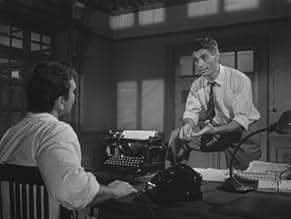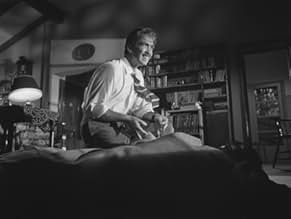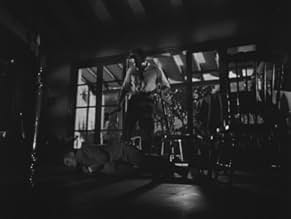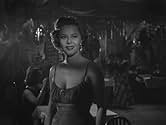Adicionar um enredo no seu idiomaA washed up reporter teams up with an immigrant from Hungary to start a fake journalism by correspondence school.A washed up reporter teams up with an immigrant from Hungary to start a fake journalism by correspondence school.A washed up reporter teams up with an immigrant from Hungary to start a fake journalism by correspondence school.
- Direção
- Roteiristas
- Artistas
- Prêmios
- 2 vitórias no total
Otto Webber
- Noriega
- (as Otto Weber)
George Hilton
- Hombre en redacción
- (as Jorge Hilton)
- Direção
- Roteiristas
- Elenco e equipe completos
- Produção, bilheteria e muito mais no IMDbPro
Avaliações em destaque
Very dated movie done --part of it-- as expressionistic 1930s German cinema, part as realistic 1950s European neo realism, all mixed up with a very Argentinian way of interpreting the brief and blunt dialogs throughout the whole movie.
The story is quite interesting. It could have been superbly interesting if the script could have been fully developed going deeply into the main character psychology and motives for his behavior instead of the bumpy way shown here so abruptly from one scene to the next (unless I saw a faulty copy with missing scenes).
Our tortured main character motivations for what he does, as seen in this version, is totally incomprehensible, since he has no real proof to take such a drastic measure to solve the dilemma that tortures his feverish mind.
The photography may be the best asset in this film, done in black and white with a very impressive atmosphere, dark and oppressive almost all the time.
The soundtrack is also very good, following the black mood of the story very precisely and to the point.
But the whole feeling disclosed here, either about the city, its people or our protagonists is nowadays as removed from us as a Christopher Columbus ship could be as incongruous standing next to an atomic submarine.
The story is quite interesting. It could have been superbly interesting if the script could have been fully developed going deeply into the main character psychology and motives for his behavior instead of the bumpy way shown here so abruptly from one scene to the next (unless I saw a faulty copy with missing scenes).
Our tortured main character motivations for what he does, as seen in this version, is totally incomprehensible, since he has no real proof to take such a drastic measure to solve the dilemma that tortures his feverish mind.
The photography may be the best asset in this film, done in black and white with a very impressive atmosphere, dark and oppressive almost all the time.
The soundtrack is also very good, following the black mood of the story very precisely and to the point.
But the whole feeling disclosed here, either about the city, its people or our protagonists is nowadays as removed from us as a Christopher Columbus ship could be as incongruous standing next to an atomic submarine.
An Argentinian film noir from 1956. Presented a couple of weeks ago as part of TCM's Noir Alley (& whose host Eddie Muller was one of the champions in saving the lost classic) which details a man's greed overwhelming his soul. Down Argentine way, a reporter, played by Carlos Cores, who's barely making ends meet runs into an opportunistic foreigner who works at a bar who sells him on a scheme to fleece readers of their money for a correspondence school scam but after a while the idea of having to separate the wad begins to weigh on Cores so one night he takes a hammer to his partner's head, burying him in his home's garden. As time passes & his partner's son shows up out of the blue (who also begins a romance w/his daughter), the tale takes a turn for the Hitchcockian (& even shades of Edgar Allan Poe as every time Cores looks out his window to his garden, there the dead body lies) w/great camera set-ups & cinematography (according to the notes I've read on the movie, this film's DP taught the peerless Gregg Toland back in the day) & an ending which would shame purported American noirs of the period (the Hays code demanded the bad guy get his). The title's translation is "The Bitter Stems" by the by.
There are several twists and turns in this film, so you'll definitely cheat yourself if you read any reviews warning of spoilers.
Thanks to the Film Noir Foundation and UCLA, the restored version aired on TCM's Noir Alley hosted by Eddie Mueller. If you can catch his intro and outro, you'll learn some interesting things, such as the original novel was awarded a very prestigious Argentinian award as was the film itself, the score is by one of Argentina's most celebrated composers, and one of South America's most popular, if not most popular, female actors of the time has a small but important role.
There's all kinds of noir style going on, but there's also echoes of Edgar Allan Poe's use of concise storytelling, paranoia, and the concept of justice as an archetype. The acting is wonderful, and the cinematography is stunning. The musical score is all over the place, but it honestly works.
A must for noir junkies.
Thanks to the Film Noir Foundation and UCLA, the restored version aired on TCM's Noir Alley hosted by Eddie Mueller. If you can catch his intro and outro, you'll learn some interesting things, such as the original novel was awarded a very prestigious Argentinian award as was the film itself, the score is by one of Argentina's most celebrated composers, and one of South America's most popular, if not most popular, female actors of the time has a small but important role.
There's all kinds of noir style going on, but there's also echoes of Edgar Allan Poe's use of concise storytelling, paranoia, and the concept of justice as an archetype. The acting is wonderful, and the cinematography is stunning. The musical score is all over the place, but it honestly works.
A must for noir junkies.
Based on this 1956 offering I'd say the Argentines have a thorough grasp of noir, no? This dark, curdled tale of not good vs evil but rather amiable crookedness vs evil is utterly fascinating. It's not a case of whom to root for but rather which of the two antagionists do we pity less? Tough call. On the one hand you have the loud, unctuous con artist and on the other there's the tortured, psychotic worm. My sympathies ultimately came down on the side of the later, but it was a close call and was made all the closer by the skilled performances of the two lead actors, Carlos Cores and Vassili Lambrinos, who perfectly embody these twin poles of ethical and moral corruption in mid 50s Argentina, as the tyrannical Peronist era was yielding to a slightly less tyrannical succession of military strongmen, an uneasy time in a country haunted by a repressive and fascistic past and facing an uncertain future. This state of mind is subtly brought out by director Fernando Ayala and his scenarist Sergio Leonardo in such scenes as the nightmares of Gaspar as he confronts his father's Nazi past and the wonderfully ironic ending where a hopeful new generation is planting flowers from bitter stems, unknowingly atop a corpse's grave. Throw in bleak, shadowy cinematography from one of Greg Toland's more apt pupils, Ricardo Younis, and a seductive jazz/tango score by Astor Piazzola and one can see why this film is a near masterpiece. Why near? Didn't like the character of Jarvis who is, in my opinion, unbelievably credulous around an obviously nutso Gaspar. Give it an A minus.
"And we decided to celebrate our end like the doomed in the movies do."
I loved the look and feel of this Argentinian noir, with its flashbacks, surreal dream sequences, and segues into the inner thoughts of its main character. Instead of a femme fatale we get a tragic figure (Aída Luz), and instead of everything coming apart because of a con game, we get drama out of misunderstanding and paranoia. These are basically good people, driven to dark places by economic desperation, with the post-war conditions in Europe looming as a distant backdrop. I wasn't completely sure about the ending, as the digging wouldn't have to be too deep and the guy should have known it (being vague here on purpose), but I loved how brutally grim it was. Overall, a very satisfying film.
I loved the look and feel of this Argentinian noir, with its flashbacks, surreal dream sequences, and segues into the inner thoughts of its main character. Instead of a femme fatale we get a tragic figure (Aída Luz), and instead of everything coming apart because of a con game, we get drama out of misunderstanding and paranoia. These are basically good people, driven to dark places by economic desperation, with the post-war conditions in Europe looming as a distant backdrop. I wasn't completely sure about the ending, as the digging wouldn't have to be too deep and the guy should have known it (being vague here on purpose), but I loved how brutally grim it was. Overall, a very satisfying film.
Você sabia?
- CuriosidadesAs discussed on TCM's Noir Alley by host Eddie Muller in July 2021, a screening of the restored 35mm print of this film was held on behalf of the Film Noir Foundation at the Museum of Modern Art (MoMA) in New York City in February 2016, and shockingly in attendance was 90 year-old Vassili Lambrinos, who, after years of living in various parts of the globe, was living just a few blocks from MoMA. Lambrinos had never seen the film on the big screen nor with an audience before that screening, having seen the film only in an editing room before then.
- Citações
Andreani: You make him infallible. You have an old passion; the need to obey.
Alfredo Gaspar: Passion to obey?
Andreani: To be a subordinate.
- ConexõesReferenced in Preserving Memory: Fernando Martín Peña on Argentine Cinema (2024)
Principais escolhas
Faça login para avaliar e ver a lista de recomendações personalizadas
Detalhes
- Data de lançamento
- País de origem
- Idioma
- Também conhecido como
- The Bitter Stems
- Locações de filme
- Plaza de Mayo, Buenos Aires, Argentina(Gasper and Jarvis walk in the Plaza de Mayo and look at the Cabildo.)
- Empresa de produção
- Consulte mais créditos da empresa na IMDbPro
- Tempo de duração1 hora 30 minutos
- Cor
- Mixagem de som
- Proporção
- 1.37 : 1
Contribua para esta página
Sugerir uma alteração ou adicionar conteúdo ausente





























